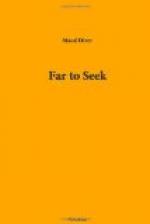“Thanks very much,” he said; and saluted, looking her straight in the eyes.
Roy, watching intently, fancied he saw a ghost of a blush stir under the even pallor of her skin. She had told him once, in joke, that she never blushed; it was not one of her accomplishments. But for half a second she came perilously near it; and although it enhanced her beauty tenfold, it troubled Roy.
Then—as the cheering died down—he saw her turn to the Colonel, who was supporting her, and heard her clear deliberate tones, that carried with so little effort: “I think, Colonel Desmond, every one must agree that the honours are almost equally divided——”
More applause; and Roy—scarcely crediting his ears or eyes—saw her pick a rose from her cluster.
The moment speech was possible, she leaned forward, smiling frankly at him before them all.
“Mr Sinclair, will you accept a mere token by way of consolation prize? We are all agreed you put up a splendid fight; and it was no dishonour to be defeated by—such an adversary.”
Fresh clapping and shouting; while Roy—elated and overwhelmed—went forward like a man walking in a dream.
It was a dream-woman who pinned the rosebud in his empty button-hole, patting it into shape with the lightest touch of her finger-tips, saying, “Well done indeed,” and smiling at him again....
Without a word he saluted and walked away.
She had done it prettily, past question; and in a fashion all her own.
FOOTNOTES:
[Footnote 24: Marquee tent.]
[Footnote 25: Criminal Investigation Department.]
[Footnote 26: Well done.]
[Footnote 27: Victory to Desmond Sahib.]
CHAPTER VI.
“Blood and brain and spirit, three—
Join for true felicity.
Are they parted, then expect
Someone sailing will be wrecked.”
—GEORGE MEREDITH.
On the night after the Gymkhana the great little world of Lahore was again disporting itself, with unabated vigour, in the pillared ballroom of the Lawrence Hall. They could tell tales worth inditing, those pillars and galleries that have witnessed all the major festivities of Punjab Anglo-India—its loves and jealousies and high-hearted courage—from the day of crinolines and whiskers, to this day of the tooth-brush moustache, the retiring skirts and still more retiring bodices of after-war economy. And there are those who believe they will witness the revelry of Anglo-Indian generations yet to be.
Had Lance Desmond shared Roy’s gift for visions, he might have seen, in spirit, the ghosts of his mother and father, in the pride of their youth, and that first legendary girl-wife, of whom Thea had once told him all she knew, and whose grave he had seen in Kohat cemetery with a queer mingling of pity and resentment in his heart. There should have been no one except his own splendid mother—first, last, and all the time.




